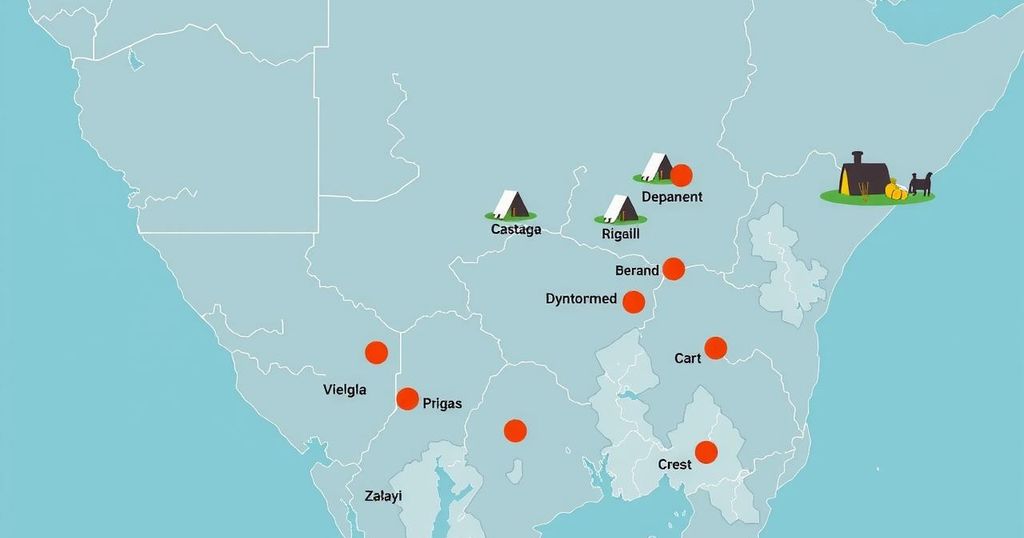Humanitarian Crisis in the Democratic Republic of the Congo: An Overview

The Democratic Republic of the Congo is facing a major humanitarian crisis due to conflict, particularly with M23 rebels, causing over seven million people to be displaced and 21 million needing aid. Goma has seen significant violence, with M23 capturing key cities and increasing food insecurity affecting a large portion of the population.
The Democratic Republic of the Congo (DRC) is currently experiencing one of the most severe displacement and humanitarian crises globally due to ongoing violence and instability, primarily linked to the activities of M23 rebels. Recent reports indicate that at least 7,000 individuals have lost their lives in the recent upheavals, with many others sustaining injuries. The situation has forced millions to flee their homes, increasing the urgency for humanitarian assistance.
In January 2025, M23 rebels captured Goma, a strategically significant city in the mineral-rich North Kivu province. The rebels subsequently extended their territorial control by seizing Bukavu, the capital of South Kivu province, just a month later. This escalation is attributed to intensified operations by various armed groups, particularly M23, which has significantly affected the regional stability.
M23, formed in 2012 by former Congolese soldiers, primarily from the Tutsi ethnic group, takes its name from the March 23 Movement following a failed peace agreement with the DRC government. The group, which had previously been dormant, reemerged in late 2021 and has since launched aggressive military actions, leading to accusations of support from Rwanda, which the Kigali government denies.
The conflict intensified following the cancellation of peace talks in December 2024 between DRC and Rwanda, primarily over M23’s demands for direct dialogue. Following this, M23 achieved significant military successes in early 2025, rapidly advancing and capturing strategic locations, including the key city of Goma and the mining hub of Walikale, disregarding ceasefire calls.
The impact of the conflict has led to the displacement of over seven million individuals within the DRC, with a significant concentration of 3.8 million in the North and South Kivu provinces alone. Between November 2024 and January 2025, nearly 780,000 people were reported to have fled from their homes as humanitarian conditions worsened. Many refugees have crossed into neighboring countries, primarily Burundi and Uganda, to seek safety.
Conditions in Goma remain perilous, exacerbating an already dire humanitarian situation. Approximately 21 million people were in need of humanitarian aid before the recent escalation, marking the highest need globally, as reported by the UN’s Office for the Coordination of Humanitarian Affairs. Consequently, by the end of 2024, rising food prices, conflicts, and health epidemics prompted around 25.6 million people—almost a quarter of the population—to experience acute food insecurity. The looting of humanitarian supplies has further complicated relief efforts, exacerbating the crisis.
The ongoing conflict in the Democratic Republic of the Congo has precipitated a severe humanitarian crisis, with millions displaced and in dire need of assistance. The M23 rebels have contributed significantly to this instability through aggressive territorial gains, while the broader humanitarian situation reveals alarming levels of food insecurity and disruption to aid efforts. Direct intervention and sustained international support remain critical in addressing these urgent humanitarian needs and stabilizing the region.
Original Source: www.aljazeera.com








